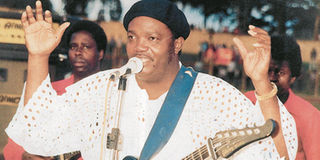Secrets of Franco, the grand maestro of Congolese rhumba

Franco Luambo Luanzo Makiadi. Photo/FILE
For all his popularity as a musical genius, there has always been some mystery about Franco Luambo Luanzo Makiadi, the man. Some of his early fans in the Democratic Republic of Congo, suspicious of his skills, nicknamed him “the Sorcerer”.
Even today, 20 years after his death, questions linger how a boy his mother named Makiadi – meaning bound for misfortune – at birth, and who spent much of his childhood on the hostile streets of Kinshasa instead of school turned out the titan of Congolese music and an African folk hero.
Popular accounts have tended to put it down to his talent: a wizard on the guitar with a bewitching voice. But in Africa’s greatest – a Restropective Vol 1: 1953-1980, Ken Braun of the world music label and distributor Sterns Music and a Congolese music expert, digs deeper into the cultural treasure trove of the Congo and unravels the mystery of a man who might have unwittingly prophesied his destiny at 15.
The palm-size booklet released in 2008 bears an emblem of authority, with insider information provided by Franco’s surviving confidantes in the TPOK Jazz like Fanfan Se Sengo, Sam Mangwana, Wuta-Mayi and Papa Noel.
The legend
The author also reviews Franco’s record collection and tries to understand the legend from such books as Congo Colossus, The Life and Legacy of Franco & OK Jazz by Graeme Ewens, and Rumba on the River, A History of the Popular Music of the Two Congos by Gary Stewart.
On his first day on the job, on August 3, 1953, at the recording firm Loningisa which had recently given him the opportunity to hone his rudimentary skills with a 10-year contract, Franco sang half a dozen songs.
Esengo ya Mokili (Pleasure in this world) would prove the most notable not just for the hedonistic feel about it, but the sense of destiny. In a trumpeting voice, Franco joined the chorus: “What a pleasure in this world to be famous!”
“Young Franco had the pleasure of being, if not really famous yet, at least a popular musician in Leopoldville (now Kinshasa),” writes Braun. His early days at Loningisa entailed a fairly inconspicuous role backing the established stars at performances in the studio, bars and nightclubs.
But Franco didn’t have to wait too long to declare his ambitions either. Soon he wrote songs and occasionally sang the lead. By 1956, he and his colleagues in the studio band, Bana Loningisa, felt they were good enough to venture out and hold their own in the cut-throat Kinshasa nightlife and transformed themselves into the OK Jazz.
The star singer of the group that performed on weekends at the OK Bar was Vicky Longomba, but Franco was the crowd puller, and the natural leader. “Franco was the most prolific of the band’s several songwriters and most often the music director, playing his guitar just like ringing a bell or wielding it like a conductor’s baton. Tall, sharply dressed and quick with a grin, he stood out whether he was on stage or on the town,” writes Braun.
“Although he was only 19 and neither well born nor well schooled, he exuded self-confidence and impressed everyone who encountered him.” Still, the star power of Vicky Longomba and leadership abilities of Franco would have been too little to challenge the dominance of bands like the Ochestre African Jazz.
So it came down to some smart and strategic thinking by the OK Jazz team to style themselves as a modern group with a touch of class and professionalism. “Franco and his associates represented a new kind of Congolese: urbanites. They were professional entertainers, self-promoters and trend-setters,” writes Braun.
A typical audience at the OK Bar included entrepreneurs, artists, intellectuals and political activists as well as shop clerks, market women, dockworkers, hustlers and prostitutes.
Again, Franco was the master showman who rode in a motor scooter and swaggered around town in the latest fashions.
His tastes for the finer things in life extended to keeping the company of beautiful wives and mistresses.
To stay ahead of the competition, Franco ensured that their band had a large concentration of talent and occasionally raided the rival ranks to replace defectors or add value to their music. A dynamic artiste, he was never shy to hijack an idea already identified with a rival, improve it and own it.
One of the least known truths about Congolese music is that Franco was a relative latecomer to soukous — the dynamic music-dance style in which the song had a shift in rhythm and movement at some point that emerged in the early 1970s.
“Franco lagged behind others in developing the style, but when he picked it up he scribbled his signature on it,” says Braun. He would spectacularly lead OK Jazz through four movements, each with a different rhythm in Marie Naboyi, ending with Franco crooning like James Brown.
It’s also noteworthy that he composed the song after listening to a piece by his younger brother, Bavon Marie-Marie Siongo. Throw in a leadership style Braun describes as democratic and the patience of the biblical Job and it becomes clear why Franco was able to hold a large band with big egos together at any given time.
He did not rush to claim OK Jazz’s leadership until Vicky Longomba quit in 1960. But even after he became the first among equals, he opted for a consensus approach to key decisions in the band. “He usually encouraged collegiality and gave everyone a fair hearing and fair rewards,” writes Braun.
Yet his strength as a pop star ultimately lay in his appeal among the masses. He cast himself as an ordinary man, empathised with the common people and chided the authority in his lyrics often decorated with mbwaleka (cryptic criticism). No doubt his cause was helped by historical circumstances.
“By the end of the decade, as both the Belgian Congo and the French Congo were tumbling toward independence, Franco was becoming widely recognised as a Congolese hero… for the cultural archetype he embodied… he represented millions who felt sure they were the generation that would rule themselves.”
When soon after independence in 1960 civil war broke out in Congo, Franco took to the stage to uplift the spirits of a downcast people with upbeat dance tunes and voice their anxiety.
His going to bed with Mobutu – the dictator who took over power in Congo in 1965, renamed it Zaire and presided over the plunder of its mineral wealth in the subsequent years – has been documented as one of the darkest chapters of Franco’s life.
But where others see a traitor, Braun sees a shrewd musician-cum-businessman who exploited his closeness to power to make money and strengthen his own grip on the Congolese entertainment industry.
“Franco had grown up poor and uneducated, but he was no fool. He understood the benefits Mobutu could bestow on him just as the dictator recognised the musician’s stature among the people whose favour they both coveted,” says Braun.
Needless to say Mobutu rewarded Franco with the presidency of the national musicians’ union, which had a controlling hand in the official royalty agency. This, of course, does nothing to sanitise Franco’s personal flaws as a celebrity. Braun writes that the musician’s lowest moment was the night in 1970 when his brother Marie-Marie committed suicide.
After accusing Franco of seducing his girlfriend, Marie-Marie dragged the girl into his car, sped off and rammed into a truck. He died. The woman lost both legs.
It took a devastated Franco four years to mention his brother’s name on record in the anguished lyrics of Kinsiona (Grief). He sang about malicious rumour “killing this community”, although his weakness for women is legendary. As Braun writes, the grandmaster of rumba had several wives and countless mistresses, some stolen from colleagues.




